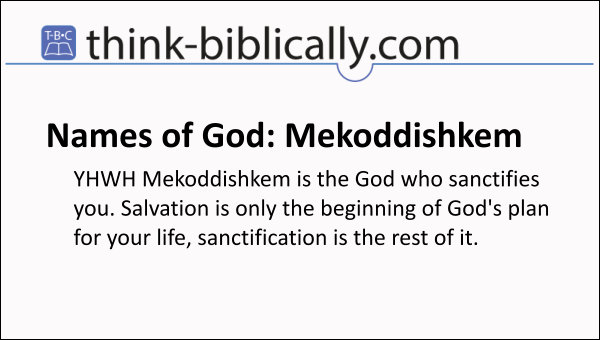By Tyson Thorne

The Lord said to Moses, “Tell the Israelites, ‘Surely you must keep my Sabbaths, for it is a sign between me and you throughout your generations, that you may know that I am YHWH Mekoddishkem [the Lord who sanctifies you]. So you must keep the Sabbath, for it is holy for you. Everyone who defiles it must surely be put to death; indeed, if anyone does any work on it, then that person will be cut off from among his people. Six days work may be done, but on the seventh day is a Sabbath of complete rest.... — Exodus 31.12-15a
Twice the Lord uses this name for himself, YHWH Mekoddishkem, in the passage above and in Leviticus 20.8 (which we'll get to in a moment). The name means "the God who sanctifies" and, though rare, has significant overtones. "Santification" is one of those seminary words one rarely hears from the pulpit, but trust me when I say that the idea is likely preached every Sunday. Salvation is only the beginning of God's plan for your life, sanctification is the rest of it. Sanctify means "to make holy," or "to set apart as sacred"; sanctification is the process by which this happens.
In the Old Testament context, Israel was God's only people — a people set apart for the service of God. That didn't mean they could not be farmers, or architects, or writers, artists or musicians. Israel had people proficient in all these things, and more. Only the Levites were priests, all the other tribes contributed to the nation through their day jobs but that didn't make them any less holy. How one makes a living neither adds nor subtracts from a person's sanctity, only disobedience can do that. Which brings us back to the Exodus passage above.
In the Exodus text God is impressing upon the Israelites the importance of Sabbath. As a nation they are to mirror God's example in creation. During those beginning acts of God, the Lord created for six days and "rested" on the seventh. The Hebrew word for "rest" used here literally means to "stop" or "cease". God stopped creating for one day after six days of creation, and the Hebrews were meant to follow God's example in this as in all things. (While not the point of this article, this is one way we know that the days of creation were six 24-hour days and not representative of thousands or millions of years.) This practice would set them apart from all the other nations around them.
When God said to cease, or rest, he meant it. All meals were to be prepared the day before so no cooking had to be done. No cleaning either, or tending to flocks or herds. For this one day, starting at Sunset on Friday and ending Saturday night when at least three stars can be seen. No other culture behaved in such a manner and was one very visible example of the separateness of the Jewish people. For this reason, disobedience called for capital punishment. God takes our sanctity, our holiness, our obedience very seriously. This is made clear in the second occasion of the use of this name of God:
“‘You must sanctify yourselves and be holy, because I am the Lord your God. You must be sure to obey my statutes. I am YHWH Mekoddishkem [the Lord who sanctifies you]." — Leviticus 20.7-8
The importance of holiness, of sanctification, is not only an Old Testament principle. It is a timeless command iterated throughout the New Testament too. In the Greek language there is more than a past, present and future tense, there is a tense that describes a process as starting in the past, working in the present and completing in the future. Words expressing this tense are often viewed as completed, since the completion is sure to happen. "Sanctified" is often used in this manner. See 1 Corinthians 1.30 for example, "[God] is the reason you have a relationship with Christ Jesus, who became for us wisdom from God, and righteousness and sanctification and redemption...". In the present sense, Jesus is our sanctification and through the process of becoming more and more obedient the process of sanctification is ongoing. For more on this topic see also 1 Thessalonians 4.3, 5.23, Hebrews 2.11, 9.13, 10.10-29 and 13.12. Because we are set apart (holy) in Christ Jesus we are also to be set apart in practice. While that may look differently in our culture than it did in ancient Israel, our lifestyle is still to be markedly different from the culture in which we live.
